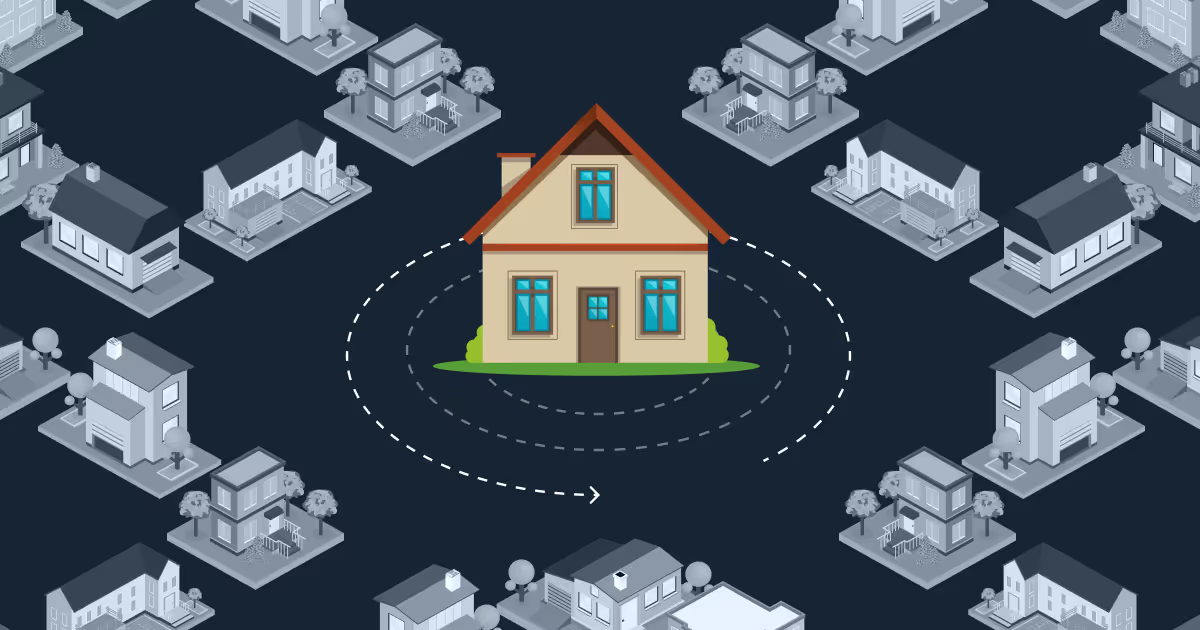
If you're looking to safeguard your online activities, you've likely encountered terms such as proxy servers and VPNs; but understanding their roles and functionalities can be quite a puzzle. This article aims to clarify these concepts, highlighting how VPNs and proxies differ, their advantages and drawbacks, and the use cases where each shines. Get ready to learn all you need to confidently choose between a VPN and a proxy for your internet security.
What is a Virtual Private Network (VPN)?
A VPN, or Virtual Private Network, extends a private network across a public network, enabling users to send and receive data across shared or public networks as if their computing devices were directly connected to the private network. This is achieved through secure protocols such as OpenVPN, L2TP/IPsec, and IKEv2, which establish encrypted tunnels. These protocols ensure that all data traffic is securely transmitted, preventing eavesdropping and tampering.
For instance, if you use public Wi-Fi at a cafe to access sensitive work documents, a VPN will shield your data from prying eyes.
What is a Proxy?
A proxy server acts as a gateway between the user and the internet. It's a server, referred to as an “intermediary,” because it goes between end-users and the web pages they visit online. While a proxy can alter your IP address, it doesn't inherently encrypt your internet traffic. Proxies are application-specific, meaning they only reroute the traffic of a specific app or browser.
Consider you're in the UK and want to watch a US-only show. A proxy can make it appear as if you're browsing from the States.
Understanding their Advantages and Use Cases: VPNs vs. Proxies
Using a VPN
- Comprehensive Security: VPNs offer end-to-end encryption for all internet traffic, significantly enhancing data security and protection from cyber threats.
- Enhanced Privacy: By masking the user's IP address and encrypting data, VPNs prevent ISPs (internet service provider) and websites from tracking your online activities.
- Access to Restricted Content: VPNs enable users to bypass geographical restrictions, making them ideal for accessing a broader range of content globally.
- Safe Public Wi-Fi Use: They provide a secure way to use public Wi-Fi networks, protecting users from potential vulnerabilities associated with these networks.
- Versatility in Usage: VPNs are suitable for a wide range of online activities, from browsing and streaming to secure communication and remote work.
Using a Proxy
- Web Scraping: Proxies, especially residential proxies, are highly effective for web scraping, as they can mimic real user behavior, reducing the likelihood of being blocked by websites.
- Geo-Spoofing: Useful for accessing content or services available only in specific geographic locations.
- Network Control and Efficiency: In corporate environments, proxies can manage and distribute internet traffic to optimize network performance.
- Improving Online Performance: Proxies can enhance speed and bandwidth efficiency for certain tasks, like faster loading of web content.
- Residential Proxies for Enhanced Legitimacy: Residential proxies use IP addresses assigned to real residential locations, offering higher legitimacy and lower chances of being blacklisted, ideal for sensitive tasks like market research or ad verification.
Comparison Table between VPN and Proxy
<table class="GeneratedTable">
<tr>
<th>Category</th>
<th>VPN</th>
<th>Proxy</th>
</tr>
<tr>
<td>Functionality</td>
<td>Encrypts the entire internet connection.</td>
<td>Acts as an intermediary for specific applications.</td>
</tr>
<tr>
<td>Security and Privacy</td>
<td>VPNs offer high-level encryption, concealing your IP address and activities from interception, tracking, and bypassing geo-restrictions.</td>
<td>Proxies, particularly non-SSL/HTTPS types, offer less security. SOCKS5 proxies provide a balance between speed and security. They can hide your browsing from ISPs but are less effective against advanced trackers.</td>
</tr>
<tr>
<td>Setup and Configuration</td>
<td>Can be slightly complex, involving the installation of a client and selection of a server and protocol.</td>
<td>Generally easier to set up, requiring only the input of server address and port in browser or app settings.</td>
</tr>
<tr>
<td>Internet Performance and Speed</td>
<td>Can slow down connection due to encryption and server distance.</td>
<td>Generally faster for tasks not requiring encryption, less overhead.</td>
</tr>
<tr>
<td>Compatibility</td>
<td>Compatible across a wide range of devices and apps, though some might need extra configuration or software.</td>
<td>Work with devices and apps that support proxy settings, usually limited to one app or browser at a time.</td>
</tr>
<tr>
<td>Cookies and Trackers</td>
<td>Can effectively block or delete cookies and other trackers, often including features like ad blockers or anti-malware.</td>
<td>May block or delete cookies but are less effective against sophisticated trackers like fingerprinting or web beacons.</td>
</tr>
</table>
Table detailing VPN vs. Proxy in functionality, security, setup, speed, and compatibility.
When to Choose a VPN or Proxy Server
When it comes to selecting either a VPN or a proxy server, understanding your needs and preferences is key. Here’s a breakdown to help you decide.
Geolocation Coverage:
If you require access to a wide range of geographical locations, proxy servers generally offer more options than VPNs.
Data Encryption:
For the security of your private data, VPNs are a better choice. They encrypt your internet traffic by default, unlike standard proxy servers, which typically do not offer encryption (except for SSL or HTTPS proxies).
Logging Policies:
Concerned about your online privacy? Both VPNs and proxy servers might record details like your IP address and browsing history. While many VPNs claim to have no-logs or minimal-logs policies, this isn't always the case.
Internet Speed:
If speed is a priority, proxy servers can be faster as they don't encrypt data. However, they might also be slower due to server congestion or quality issues. VPNs are generally slower due to encryption but can be optimized for performance.
Cost:
VPN services can be more budget-friendly, often offering deals and special offers. Proxies, especially those geared towards commercial use, are typically more expensive. Free versions are available for both but may have limitations in functionality, reliability, and data security.
IP Concealment:
Need to hide your IP address? Both proxies and VPNs can do this, but they are not infallible and might be detected by some websites.
Reliability and Safety:
To avoid risks like malware, choose a reputable and ethical proxy service or VPN provider. Ensure they have a good track record for safety and reliability to minimize security threats.
Device and Platform Compatibility:
Go for a VPN if you need wide compatibility across various devices and operating systems. A proxy server is suitable when specific compatibility or configuration is required for specialized tasks.
Legal and Compliance Factors:
In regions with VPN restrictions or specific legal considerations, a proxy server might be the more viable option, provided it complies with local regulations.
Server Network Quality:
Choose a VPN for a large server network and a proxy server for specific, high-quality server needs.
If you are only concerned about hiding your IP address from a single site or app, a free proxy server may be suitable. However, keep in mind that free proxy servers can be slower and less secure than VPNs.
Many proxy servers are free, in contrast to VPNs, which are usually paid-for. It's important to research proxy service providers to understand their features and benefits before making a choice.
Parents, employers, and network administrators often use a transparent proxy to monitor online activity, block access to specific websites or content, and authenticate users. This can provide anonymity and a seamless user experience.
A transparent proxy server can also be used to bypass restrictions set up by the server, offering another layer of utility for specific needs.
Conclusion: Making Your Choice
To sum up, the article highlighted the distinct roles of VPNs and proxies in enhancing online security. VPNs excel in offering extensive security and privacy, suitable for a wide range of internet activities. Proxies, on the other hand, are optimal for targeted tasks like geo-spoofing and web scraping. Equipped with these insights, you can make an informed decision to enhance your digital safety according to your specific needs.
Frequently Asked Questions: VPNs vs. Proxies
1. Can I Use a VPN and Proxy Together?
Yes, it is technically possible to use a VPN and a proxy together. However, this setup is usually unnecessary for most users. Using both simultaneously can significantly slow down your internet connection and complicate your setup without providing substantial additional benefits in terms of privacy or security.
2. Should I Use a Free Proxy or a Free VPN?
Whether to use a free proxy or a free VPN depends on your specific needs. Free proxies are suitable for basic tasks like bypassing geo-restrictions for streaming or web scraping. However, they offer limited security. Free VPNs provide better security and privacy but often come with limitations like slower speeds, data caps, and fewer server options. Always be cautious, as some free services may compromise your data privacy.
3. What Should I Use – VPN or Proxy Server?
The choice between a VPN and a proxy server depends on your requirements. If you need full encryption and enhanced security for all your internet traffic, along with privacy and access to geo-restricted content, a VPN is the better choice. If you're looking for a quick and easy way to change your IP address for specific tasks or applications, a proxy server will suffice.
4. Which is Better: VPN or Proxy?
Neither is inherently better; it depends on your needs. VPNs are generally better for comprehensive online security, privacy, and accessing a wide range of geo-restricted content. Proxies are more suitable for specific tasks like anonymous browsing, geo-spoofing, or web scraping, where detailed encryption isn't a priority.
5. Are VPNs and Proxies Legal?
In most countries, the use of VPNs and proxies is legal. However, the legality can vary based on your location and the specific use case. Some countries have restrictions or outright bans on VPN usage. Always ensure that you're compliant with local laws when using these tools.
FAQ
+
+
+
+
+
+
+
+
+
+
Discover your ideal proxy
Loading...











.png)


